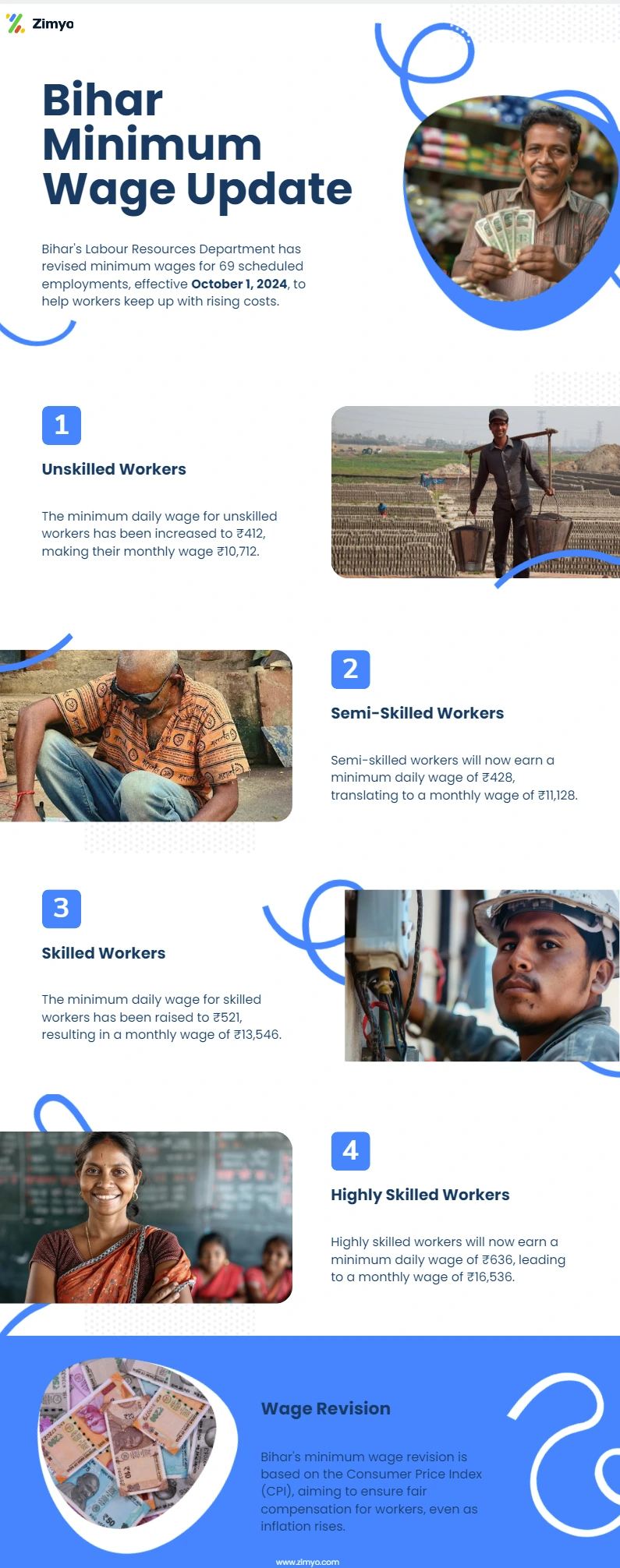Have you heard about the latest minimum wage revision in Bihar? If you’re a worker or an employer in the state, this change will impact you. On October 1, 2024, the Labour Resources Department of Bihar introduced a significant minimum wage revision for 69 scheduled employments. The new wage structure aims to provide better compensation and ensure that workers can keep up with the rising cost of living.
But what exactly does this mean for workers and businesses? Let’s break it down and see how this revision could affect you.
Why the Revision?
Every few years, states revise the minimum wage to reflect changes in the economy. Rising costs of living and inflation are two key factors. In Bihar, this new revision is tied to the Consumer Price Index (CPI), which measures inflation. The CPI helps ensure that wages increase in line with economic realities, so workers aren’t left behind.
The revision is not just about numbers—it’s about fairness and improving living standards. By increasing the minimum wages in Bihar, the government wants to make sure that workers across different sectors can support their families and live more comfortably.
What Are the New Minimum Wages in Bihar?
Let’s get into the specifics. The revised minimum wage structure is categorised based on skill levels, and here’s a clear breakdown of the new rates:
Class of Employment | Basic Per Day | Basic Per Month | VDA Per Day | VDA Per Month | Total Per Day | Total Per Month |
|---|---|---|---|---|---|---|
Unskilled | ₹ 410.00 | ₹ 10,660.00 | ₹ 2.00 | ₹ 52.00 | ₹ 412.00 | ₹ 10,712.00 |
Semi-Skilled | ₹ 426.00 | ₹ 11,076.00 | ₹ 2.00 | ₹ 52.00 | ₹ 428.00 | ₹ 11,128.00 |
Skilled | ₹ 519.00 | ₹ 13,494.00 | ₹ 2.00 | ₹ 52.00 | ₹ 521.00 | ₹ 13,546.00 |
Highly Skilled | ₹ 634.00 | ₹ 16,484.00 | ₹ 2.00 | ₹ 52.00 | ₹ 636.00 | ₹ 16,536.00 |
Supervisory/Clerical | ₹ 451.00 | ₹ 11,736.00 | ₹ 1.70 | ₹ 44.00 | ₹ 453.00 | ₹ 11,780.00 |
These new rates are valid from October 1, 2024, and will remain effective until March 31, 2025.
What Does This Mean for Workers?
For workers in Bihar, this is a win. The minimum wages revision means that those in unskilled and semi-skilled jobs will see an increase in their monthly earnings. This directly impacts their ability to cover daily expenses like food, rent, and healthcare.
For example, an unskilled worker will now earn a minimum of ₹10,712 per month, up from ₹10,660. While the increase may seem modest, every little bit counts when you’re managing tight household budgets. Workers in skilled and highly skilled categories will also benefit from the hike, which will make a significant difference over time.

Sectoral Coverage: Who Benefits?
This revision applies to a wide range of industries. The minimum wages in Bihar cover 69 scheduled jobs, from agriculture to construction, food processing, textiles, and even the information technology sector. Whether you’re a construction worker or an IT professional, the wage increase applies to you.
Additionally, businesses in these sectors will need to be fully compliant with the new wage structure. Employers must be mindful of these changes, as the Labour Resources Department will monitor and enforce the revised rates.
Compliance and Enforcement
Are you an employer? It’s essential to adhere to the new minimum wage rates. Non-compliance could result in penalties. The Labour Resources Department has made it clear that monitoring will be stricter moving forward. Employers need to be assured that all wages, including the Variable Dearness Allowance (VDA), are paid accurately.
If you fail to comply with the new rates, your business could face fines or legal actions. So, it’s not just about following the rules—it’s about maintaining a good relationship with your employees and providing fair compensation.
Why the Variable Dearness Allowance (VDA) Matters
You might be wondering—what is the Variable Dearness Allowance (VDA), and why is it important? The VDA is linked to the Consumer Price Index (CPI) and is adjusted to help workers keep pace with inflation. In this minimum wage revision in Bihar, the VDA has been set at a minimum of ₹2 per day for most categories. This may not seem like much, but it adds up over time.
By tying the VDA to inflation, Bihar is assuring that workers’ purchasing power remains intact, even when the prices rise.
Implications for Employers and the Economy
Employers in Bihar will need to adjust their payrolls to meet the new wage requirements. This may result in increased labour costs for businesses, but the overall economic benefit could outweigh these costs. When workers have more money in their pockets, they spend more, which boosts the local economy.
For example, a highly skilled worker earning at least a minimum of ₹16,536 per month will have more disposable income. This increase in consumer spending can stimulate economic growth. Thus, benefiting businesses in the long run.
Conclusion: A Step Forward for Bihar's Workers
The minimum wage revision in Bihar is a significant step towards improving the lives of thousands of workers. By adjusting wages to reflect inflation and the cost of living, the Labour Resources Department has shown a commitment to worker welfare.
Hence, this revision not only benefits workers but also pushes employers to maintain fair practices. So, it’s essential for both parties—employers and employees—to stay informed and adhere to these new regulations.
Therefore, if you’re a worker, this could be a much-needed boost to your income. Moreover, if you’re an employer, it’s time to make sure you’re in full compliance with the minimum wage laws in Bihar.
Thus, by keeping the focus on fairness and economic reality, the Bihar government is helping create a more just and balanced labour market.
Reference: Hindustan Times




